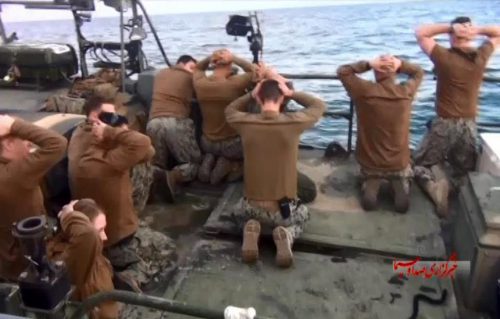Admiral Mannix served in the Spanish-American War, the conflicts in Cuba and the Philippines, and the First World War. His career spanned the years of America’s emergence as a major player on the world stage, and this book offers memorable portraits of the Navy and of America…and of much of the world…during this period.
After spending his childhood in China (his father was a torpedo expert working for the Chinese government), Mannix entered the US Naval Academy in 1885. When the battleship Maine blew up in Havana harbor and the Spanish-American war erupted in 1898, he requested permission to leave the Academy early, and joined the battleship USS Indianapolis.
The war resulted in a rapid American victory, despite some serious deficiencies in the American conduct of operations (such as the failure to use smokeless powder), and Mannix observed the sad passage of the Spanish admiral into American captivity, in an open boat, wearing civilian clothes loaned to him by an American captain and with his head lowered in deep dejection: “I was never so sorry for anyone in my life.” He was impressed by the exquisite courtesy of a badly-wounded Spanish officer who had lost a leg:
As though making his adieux after an enjoyable evening, he thanked us for our “hospitality” (no, he wasn’t being sarcastic) and expressed his profound regret for the annoyance that his unfortunate arrival had caused…I have met men of all nationalities during my years in the Navy; in “good breeding” none of them could equal the upper-class Spaniards.
After returning to Annapolis, Mannix graduated in 1900, and he sketches what life was like in America at the turn of the last century: some of the popular songs and comedy acts, the Gibson Girl (“the loveliest of all feminine ideas”, in his view), but also the fear of riots and attempted revolution when President McKinley was assassinated in 1901…New York’s ‘streetcar rowdies’, who molested women and beat up any man who tried to stop them…and a riot in Pensacola’s red-light district which involved civilians, soldiers, and sailors (“a far rougher lot than today’s bluejackets”) and which Mannix led a landing party to suppress.
In 1903, Mannix was assigned to a “friendly mission” of four warships to German ports, as ordered by Theodore Roosevelt. “These ‘friendship tours’ were quite common in those days and paradoxically served a dual purpose: they reminded the foreign power that we had a powerful Navy that could reach their home waters while at the same time allowed the people to meet Americans and learn that we were not all strange, uncivilized barbarians.”
Assigned as an aide on the Admiral’s staff, aboard the battleship Kearsage, he met many German officers and found them mostly friendly. The Kaiser also visited Kearsage, and Mannix was impressed that he chatted with the enlisted men as well the officers. “Much to my surprise, he showed a sense of humor.”
One potentially-disastrous incident involved a collision between a German (or at least Prussian) custom: civilians on the street were supposed to give way to any uniform-wearing officer…and an American naval custom: officers generally did not wear their uniforms when ashore. This collision of customs lead to a physical collision, followed by the use of fists by the American officer, and a challenge to a duel. The situation could have led to a serious diplomatic incident had it not been defused.
Throughout his travels, Mannix enjoyed meeting people from other countries…a view that he says was far from universal. Speaking of a luncheon given by the Lord Mayor of London, he says, “To my astonishment, most of the junior officers were reluctant to attend the luncheon and would far rather have spent their time playing cards together or chatting in the wardroom mess.”
Some of the officers he met at the luncheon were members of the First Life Guards, an “elite” regiment that was open only to the wealthy and titled…”Kipling referred to them contemptuously as the “fatted flunkies of the Army.” But:
Twenty years later I was in Constantinople and the Household Brigade of the British Army was stationed there. I looked over the list to see if I could recognize any old acquaintances. Among all those names there were only two or three who had titles…Where were all those young earls and baronets and honorables? They were dead. Most of them had died in August 1914 during the terrible retreat from Mons when the old British Regular Army virtually ceased to exist. They were not “fatted flunkies” there.”
Read more


